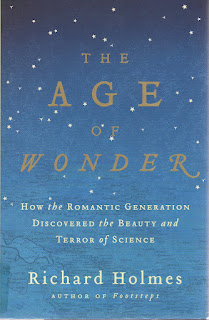Take a Chance: Age of Wonder
 The Age of Wonder: How the Romantic Generation Discovered the Beauty and Terror of Science, by Richard Holmes
The Age of Wonder: How the Romantic Generation Discovered the Beauty and Terror of Science, by Richard Holmes
4: Critic’s Choice: Find a “Best of the Year” list from a magazine, newspaper or professional critic. Read a book from their Top 10 list.
The New York Times Book Review put Age of Wonder on their Top Ten List for 2009. It's a very long book, and suffers from the flaw (common to modern non-fiction) of exhaustiveness.
Otherwise, though, it's a very interesting book that covers an amazing period in scientific development. The late 18th- and early 19th-century era saw great developments in astronomy and chemistry. Botanists and zoologists began to go out around the world on collecting trips. People started to seriously experiment with electricity and chemicals. Everyone was talking about the implications of scientific discoveries; the Romantic poets wrote essays and poems about the new questions people asked. Mary Shelley wrote Frankenstein, which asked all those questions and invented a new genre too.
Holmes uses Joseph Banks as a sort of backbone to all this material. Banks was one of the early botanist collectors and sailed to Tahiti as a young man; then he spent many years as the president of the Royal Society in England. He oversaw and encouraged the scientific developments of the early 19th century.
It's a pretty good book, but awfully long; wonderful if you are really into Romantic history, maybe something you would prefer to skim through if you're not.




Comments
Post a Comment
I'd love to know what you think, so please comment!